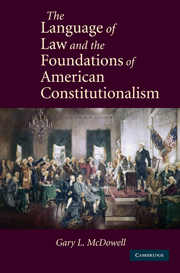Book contents
- Frontmatter
- Contents
- Preface and Acknowledgments
- The Language of Law and the Foundations of American Constitutionalism
- Introduction: The Politics of Original Intention
- 1 The Constitution and the Scholarly Tradition: Recovering the Founders' Constitution
- 2 Nature and the Language of Law: Thomas Hobbes and the Foundations of Modern Constitutionalism
- 3 Language, Law, and Liberty: John Locke and the Structures of Modern Constitutionalism
- 4 The Limits of Natural Law: Modern Constitutionalism and the Science of Interpretation
- 5 The Greatest Improvement on Political Institutions: Natural Rights, the Intentions of the People, and Written Constitutions
- 6 Chains of the Constitution: Thomas Jefferson, James Madison, and the “Political Metaphysics” of Strict Construction
- 7 The Most Sacred Rule of Interpretation: John Marshall, Originalism, and the Limits of Judicial Power
- 8 The Same Yesterday, Today, and Forever: Joseph Story and the Permanence of Constitutional Meaning
- Epilogue: The Moral Foundations of Originalism
- Index of Cases
- General Index
- References
2 - Nature and the Language of Law: Thomas Hobbes and the Foundations of Modern Constitutionalism
Published online by Cambridge University Press: 05 June 2012
- Frontmatter
- Contents
- Preface and Acknowledgments
- The Language of Law and the Foundations of American Constitutionalism
- Introduction: The Politics of Original Intention
- 1 The Constitution and the Scholarly Tradition: Recovering the Founders' Constitution
- 2 Nature and the Language of Law: Thomas Hobbes and the Foundations of Modern Constitutionalism
- 3 Language, Law, and Liberty: John Locke and the Structures of Modern Constitutionalism
- 4 The Limits of Natural Law: Modern Constitutionalism and the Science of Interpretation
- 5 The Greatest Improvement on Political Institutions: Natural Rights, the Intentions of the People, and Written Constitutions
- 6 Chains of the Constitution: Thomas Jefferson, James Madison, and the “Political Metaphysics” of Strict Construction
- 7 The Most Sacred Rule of Interpretation: John Marshall, Originalism, and the Limits of Judicial Power
- 8 The Same Yesterday, Today, and Forever: Joseph Story and the Permanence of Constitutional Meaning
- Epilogue: The Moral Foundations of Originalism
- Index of Cases
- General Index
- References
Summary
Thomas Hobbes was born in 1588 – prematurely, legend has it, due to his mother's anxiety over the Armada. A century later, England was shaken to its roots and exulted in the political implications of the Glorious Revolution. Between those two seemingly disparate events the idea of natural-rights constitutionalism was born. It was Hobbes – “the monster of Malmesbury” – who had helped to plant the seeds of that juridical revolution, an upheaval of tradition that eventually would far exceed the tumultuous political events of his own seventeenth-century England.
Hobbes has been called “the greatest, and certainly the most original and stimulating philosopher that England…ever produced.” Yet he was doomed to be reviled in his own time in his own land – and for centuries to come. Indeed, Hobbes was never without his critics. From the beginning, he was assailed by all those whose power he called into question – the priests, professors, and lawyers whose views he dismissed with such glittering contempt.
But for all his critics, Hobbes was no intellectual outcast whose thought was doomed to die a wretched death of dismissal and derision. He had disciples in his own lifetime, and his works had a substantial following among many of Europe's leading intellectuals. His influence was not simply overt, either; there were those who dared not speak his name who still took his philosophy seriously.
- Type
- Chapter
- Information
- Publisher: Cambridge University PressPrint publication year: 2010

